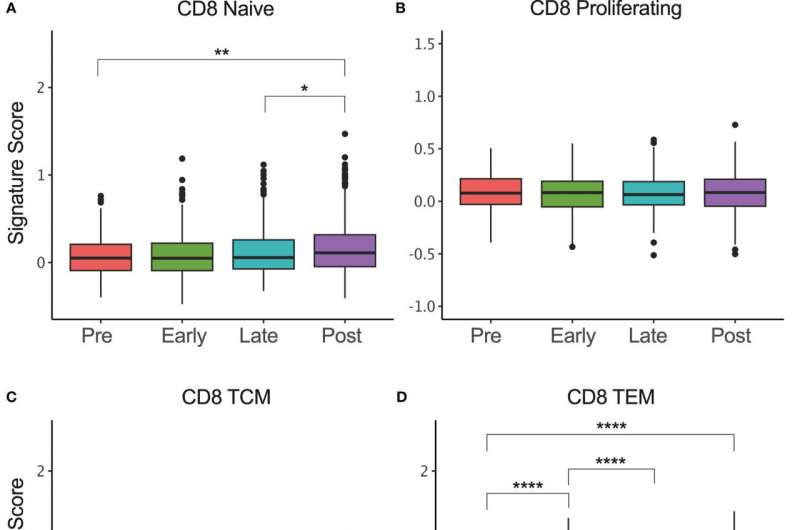This article has been reviewed according to Science X's editorial process and policies. Editors have highlighted the following attributes while ensuring the content's credibility:
fact-checked
trusted source
proofread
New findings on hepatitis C immunity could inform future vaccine development

A new USC study that zeros in on the workings of individual T cells targeting the hepatitis C virus (HCV) has revealed insights that could assist in the development of an effective vaccine.
Every year, hepatitis and related illnesses kill more than one million people around the world. If unaddressed, those deaths are expected to rise—and even outnumber deaths caused collectively by HIV, tuberculosis and malaria by 2040.
For that reason, the World Health Organization and other leading groups have pledged to work toward eliminating viral hepatitis by 2030. While there are vaccines for two of the three most common forms of viral hepatitis—hepatitis A and hepatitis B—scientists have not been able to develop one for hepatitis C. Efforts to prime the immune system to fight the virus have been thwarted, partly due to limitations in the techniques available to study individual immune cells responsible for fighting HCV.
New research from the Keck School of Medicine of USC published in the journal Frontiers in Virology, has now leveraged state-of-the-art technology to isolate and analyze individual HCV-specific immune cells for the first time. Past studies have only analyzed HCV-specific immune cells as a group.
The researchers studied CD8+ T cells, a type of immune cell whose function is to recognize and kill invaders, including viruses. CD8+ T cells find and bind to a specifically shaped piece of the virus known as an epitope, allowing them to replicate and generate an adaptive immune response to protect the body against future infections. Understanding this process at a granular level can help jumpstart research on a vaccine for HCV.
"For the first time, we were able to examine individual T cells binding to HCV epitopes, providing data that will be a valuable resource to other groups working to develop vaccines against HCV infection," said Ana C. Maretti-Mira, Ph.D., an assistant professor of research medicine at the Keck School of Medicine of USC and the study's first author. "Earlier studies were limited by the technology they used and weren't able to tell us which epitopes to target."
Isolating HCV epitopes
To learn more about the body's immune response to HCV, Maretti-Mira and her colleagues analyzed cells from three groups: patients with a chronic HCV infection, patients who recovered from HCV after receiving antiviral treatment, and people who spontaneously recovered from HCV without treatment.
Past research has only studied HCV epitopes as a group, because it is difficult and expensive to isolate them. But Maretti-Mira's team used barcoded dextramer technology, an advanced cell-labeling technique, to track two key HCV epitopes. They then used single-cell RNA sequencing to determine the gene expression of each cell in order to predict its behavior.
When a CD8+ T cell springs into action after finding an invader, it can harm or kill nearby healthy cells, too. (This is known as bystander cytotoxicity and explains why HCV can lead to liver damage.) The researchers found that antiviral treatment significantly reduced cytotoxicity in cells. They also found different mechanisms of repair in patients who received treatment versus those who spontaneously recovered, which could offer more than one pathway to developing an effective vaccine.
Broader immune system effects
In addition to studying HCV on its own, the researchers also looked at the immune response to HCV alongside two other viruses: cytomegalovirus (CMV) and influenza (flu). Previous studies suggested that people with an active HCV infection are more vulnerable to other viruses, but it was not known why.
They found that when patients with HCV had previously been infected with CMV or the flu, T cells for each virus became activated, increasing cytotoxicity, even when HCV was the only current infection.
"These cells are activated, but they cannot recognize the HCV virus," Maretti-Mira said. "That may increase the chance for liver damage and could make it harder for the patient to fight other infections."
Those broader insights about how the immune system functions when HCV is present could also help in the search for a vaccine.
Next, Maretti-Mira and her team will analyze pregnancies where the mother is affected by HCV. Unlike many other viruses, only about 5% of fetuses will contract HCV from an HCV-positive mother. Understanding why the transmission rate is relatively low could offer yet another clue about how to trigger immunity against HCV.
More information: Ana C. Maretti-Mira et al, Chronic HCV infection promotes cytotoxicity in antigen-specific CD8+ T cells regardless of virus specificity, Frontiers in Virology (2023). DOI: 10.3389/fviro.2023.1198361




















